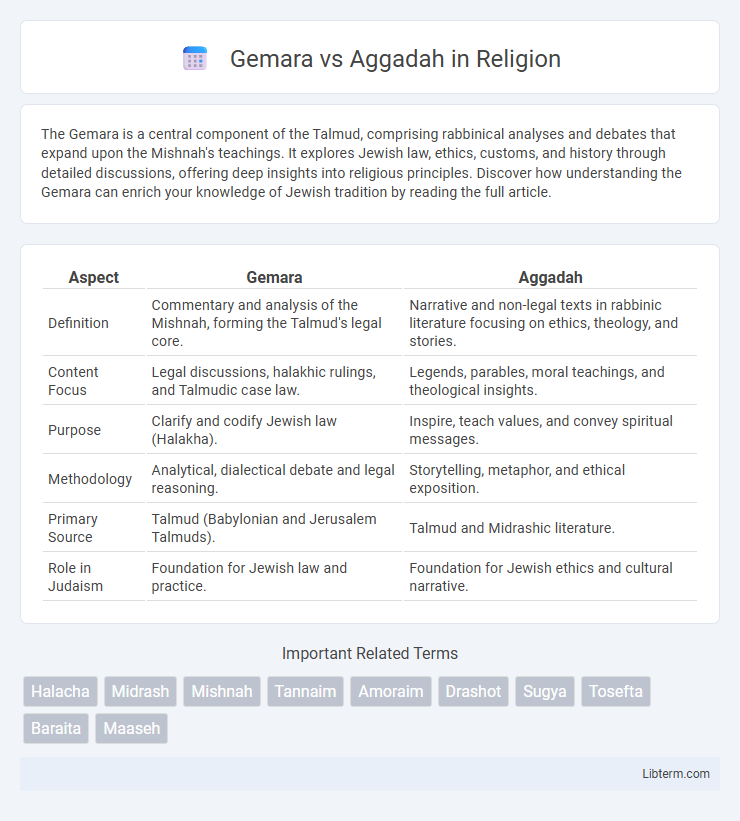The Gemara is a central component of the Talmud, comprising rabbinical analyses and debates that expand upon the Mishnah's teachings. It explores Jewish law, ethics, customs, and history through detailed discussions, offering deep insights into religious principles. Discover how understanding the Gemara can enrich your knowledge of Jewish tradition by reading the full article.
Table of Comparison
| Aspect | Gemara | Aggadah |
|---|---|---|
| Definition | Commentary and analysis of the Mishnah, forming the Talmud's legal core. | Narrative and non-legal texts in rabbinic literature focusing on ethics, theology, and stories. |
| Content Focus | Legal discussions, halakhic rulings, and Talmudic case law. | Legends, parables, moral teachings, and theological insights. |
| Purpose | Clarify and codify Jewish law (Halakha). | Inspire, teach values, and convey spiritual messages. |
| Methodology | Analytical, dialectical debate and legal reasoning. | Storytelling, metaphor, and ethical exposition. |
| Primary Source | Talmud (Babylonian and Jerusalem Talmuds). | Talmud and Midrashic literature. |
| Role in Judaism | Foundation for Jewish law and practice. | Foundation for Jewish ethics and cultural narrative. |
Introduction to Gemara and Aggadah
The Gemara is a critical component of the Talmud that provides detailed analysis and commentary on the Mishnah, focusing primarily on Jewish law (Halacha) and legal debates. Aggadah, in contrast, encompasses the non-legal narrative elements of rabbinic literature, including stories, ethical teachings, and theological reflections that enrich Jewish cultural and spiritual understanding. Together, Gemara and Aggadah form a comprehensive tapestry of Jewish thought, balancing rigorous legal discussion with moral and philosophical insights.
Defining Gemara: Scope and Purpose
Gemara serves as the analytical commentary on the Mishnah, focusing on legal discussions, clarifications, and elaborations within the Talmud. It examines intricate Halakhic principles, aiming to resolve contradictions and apply Jewish law effectively. The scope of Gemara includes dialectical reasoning that supports the development and interpretation of Halakhic rulings.
Understanding Aggadah: Nature and Themes
Aggadah encompasses the narrative, ethical teachings, and theological reflections within rabbinic literature, contrasting the legalistic focus of the Gemara. Its nature is largely non-legalistic, exploring moral lessons, folklore, and spiritual insights that provide cultural and religious context to Jewish life. Central themes include divine justice, human morality, and the mysteries of faith, enriching the interpretive tradition beyond strict halachic discourse.
Historical Development of Gemara and Aggadah
The historical development of Gemara and Aggadah traces back to the early centuries of the Common Era, with Gemara emerging primarily as a commentary and analytical expansion on the Mishnah, forming the backbone of the Talmud by the 3rd to 6th centuries CE in Babylon and Judea. Aggadah evolved concurrently as the narrative, ethical, and exegetical component within rabbinic literature, reflecting folklore, moral teachings, and theological reflections that complement the legalistic rigor of Gemara. The distinction between Gemara's legal dialectics and Aggadah's storytelling elements highlights their intertwined growth within the dynamic scholastic environment of the Amoraim and later Talmudic academies.
Literary Structures: Gemara vs Aggadah
Gemara features a dialectical structure emphasizing legal analysis and logical argumentation rooted in Mishnah interpretation, with rigorous citation of sources and debate formats. Aggadah employs narrative and poetic forms, utilizing parables, allegories, and homiletic storytelling to convey ethical teachings and theological insights. The contrasting literary structures reflect Gemara's focus on jurisprudence and Aggadah's emphasis on moral and spiritual exposition.
Halakhic Discourse in the Gemara
The Gemara primarily serves as a rigorous Halakhic discourse, analyzing and interpreting the Mishnah to clarify Jewish law through dialectical reasoning and legal debate. It systematically examines commandments, legal principles, and case law, aiming to establish practical Halakhic rulings within the broader Talmudic framework. In contrast, Aggadah comprises the non-legal narratives, ethical teachings, and exegetical stories, providing cultural and moral context without the strict legal focus found in the Gemara's Halakhic discussions.
Philosophical and Ethical Teachings in Aggadah
Aggadah offers profound philosophical insights and ethical teachings that explore the nature of humanity, divine justice, and moral conduct, emphasizing values such as compassion, humility, and social responsibility. Unlike the legalistic focus of Gemara, Aggadah uses storytelling, parables, and allegories to convey timeless wisdom and inspire ethical behavior. These narratives provide a framework for understanding the spiritual and moral dimensions of Jewish life, fostering personal growth and communal harmony.
Methods of Interpretation: Comparative Analysis
Gemara utilizes rigorous dialectical analysis and logical argumentation to interpret the Mishnah, often resolving contradictions and extracting legal principles through precise verbal scrutiny. Aggadah focuses on narrative exposition, ethical teachings, and allegorical stories, employing metaphorical and thematic interpretation to convey moral and spiritual lessons. Comparative analysis reveals Gemara's method emphasizes legal hermeneutics and conceptual clarity, whereas Aggadah prioritizes literary richness and cultural meaning within the Talmudic tradition.
Influence on Jewish Thought and Practice
Gemara, as the analytical commentary on the Mishnah, shapes Jewish legal practice by interpreting Halacha and establishing binding religious norms. Aggadah influences Jewish thought through its narratives, ethical teachings, and philosophical reflections that inspire moral values and spiritual worldview. Together, Gemara and Aggadah form the dynamic foundation of Talmudic study, blending legal rigor with ethical and theological insights that guide Jewish life.
Contemporary Relevance of Gemara and Aggadah
Gemara, as the analytical component of the Talmud, offers critical legal reasoning and jurisprudence that continues to shape contemporary Jewish law and ethical decision-making. Aggadah, encompassing narrative, homiletics, and moral teachings, provides invaluable insights into cultural identity and spiritual life, influencing modern Jewish thought and education. Both Gemara and Aggadah remain essential for understanding traditional texts while addressing modern ethical dilemmas and societal challenges.
Gemara Infographic

 libterm.com
libterm.com